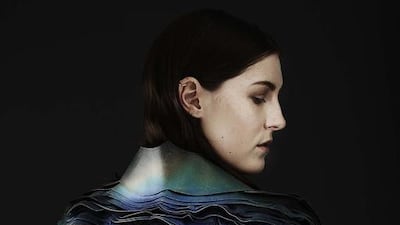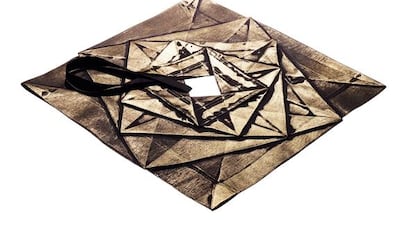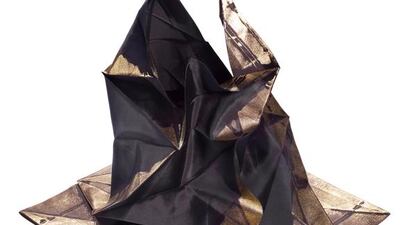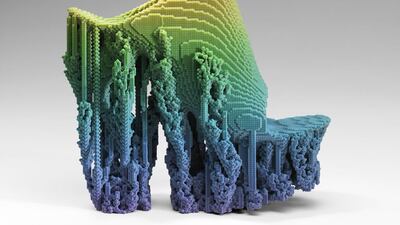Wearable technology is beginning to feature more prominently in the lexicon of fashion and textile curators. The latest exhibition to explore this trend, which fuses technology, style and increasingly, commercial sense, is #techstyle, which opened this week at the Museum of Fine Arts, Boston.
“The exhibition really looks at contemporary fashion and the kind of synergy that many designers have with technology today,” says Pamela Parmal, chair and David and Roberta Logie curator of Textile and Fashion Arts at Boston’s MFA, who is one of the show’s curators.
“They are creating not only new clothing but new ways of producing clothing, new ways for people to interact with clothing. It’s a very exciting period ... Many of today’s designers actively seek out collaborations with scientists and engineers to apply new technologies in digital media, sustainability and even biotech to their work. At the same time, scientists and engineers have embraced fashion, pushing the boundaries of manufacturing and design,” she says.
The show features more than 60 items from 33 household fashion names as well as new design talent; from dresses that have been purchased for the museum’s permanent collection to items that have been specially commissioned for the show.
Clothes in the exhibition respond to the environment, to noise and light, as well as the wearer and the spectator. For example, CuteCircuit, an ethereal dress by designers Francesca Rosella and Ryan Genz, has 10,000 micro-LEDs wired onto its surface and during the show it will publish museum-goers’ tweets.
Other garments and accessories featured leave the 3-D printer ready-to-wear. Many are laser-cut or digitally-printed and have been seen in the catwalk shows of well-known designers such as Hussein Chalayan, Alexander McQueen, Issey Miyake and Rei Kawakubo, who have led the way in fusing fashion and technology.
#techstyle illustrates the ways in which fashion is becoming yet another "active interface" between the wearer and the world, and reveals the potential for what we wear to perform for us. One dress on display is covered in dressmaking pins that move independently of the wearer in an organic response to noise. There's also a dramatic leather cape with a feathered surface (The Bird, pictured above) that changes through a spectrum of colours in response to light, heat and wind.
Finally, the production section of #techstyle shows how contemporary designers are harnessing the latest innovations in manufacturing to bring their extraordinarily inventive ideas to life.
• #techstyle is being shown at the Museum of Fine Arts, Boston until July 10. For more information, visit www.mfa.org.
Clare Dight is the editor of The Review.
What can victims do?
Always use only regulated platforms
Stop all transactions and communication on suspicion
Save all evidence (screenshots, chat logs, transaction IDs)
Report to local authorities
Warn others to prevent further harm
Courtesy: Crystal Intelligence
What the law says
Micro-retirement is not a recognised concept or employment status under Federal Decree Law No. 33 of 2021 on the Regulation of Labour Relations (as amended) (UAE Labour Law). As such, it reflects a voluntary work-life balance practice, rather than a recognised legal employment category, according to Dilini Loku, senior associate for law firm Gateley Middle East.
“Some companies may offer formal sabbatical policies or career break programmes; however, beyond such arrangements, there is no automatic right or statutory entitlement to extended breaks,” she explains.
“Any leave taken beyond statutory entitlements, such as annual leave, is typically regarded as unpaid leave in accordance with Article 33 of the UAE Labour Law. While employees may legally take unpaid leave, such requests are subject to the employer’s discretion and require approval.”
If an employee resigns to pursue micro-retirement, the employment contract is terminated, and the employer is under no legal obligation to rehire the employee in the future unless specific contractual agreements are in place (such as return-to-work arrangements), which are generally uncommon, Ms Loku adds.
Match info
Australia 580
Pakistan 240 and 335
Result: Australia win by an innings and five runs
Five famous companies founded by teens
There are numerous success stories of teen businesses that were created in college dorm rooms and other modest circumstances. Below are some of the most recognisable names in the industry:
- Facebook: Mark Zuckerberg and his friends started Facebook when he was a 19-year-old Harvard undergraduate.
- Dell: When Michael Dell was an undergraduate student at Texas University in 1984, he started upgrading computers for profit. He starting working full-time on his business when he was 19. Eventually, his company became the Dell Computer Corporation and then Dell Inc.
- Subway: Fred DeLuca opened the first Subway restaurant when he was 17. In 1965, Mr DeLuca needed extra money for college, so he decided to open his own business. Peter Buck, a family friend, lent him $1,000 and together, they opened Pete’s Super Submarines. A few years later, the company was rebranded and called Subway.
- Mashable: In 2005, Pete Cashmore created Mashable in Scotland when he was a teenager. The site was then a technology blog. Over the next few decades, Mr Cashmore has turned Mashable into a global media company.
- Oculus VR: Palmer Luckey founded Oculus VR in June 2012, when he was 19. In August that year, Oculus launched its Kickstarter campaign and raised more than $1 million in three days. Facebook bought Oculus for $2 billion two years later.
Lexus LX700h specs
Engine: 3.4-litre twin-turbo V6 plus supplementary electric motor
Power: 464hp at 5,200rpm
Torque: 790Nm from 2,000-3,600rpm
Transmission: 10-speed auto
Fuel consumption: 11.7L/100km
On sale: Now
Price: From Dh590,000
Company profile
Name: The Concept
Founders: Yadhushan Mahendran, Maria Sobh and Muhammad Rijal
Based: Abu Dhabi
Founded: 2017
Number of employees: 7
Sector: Aviation and space industry
Funding: $250,000
Future plans: Looking to raise $1 million investment to boost expansion and develop new products
The%20specs
%3Cp%3E%3Cstrong%3EEngine%3A%3C%2Fstrong%3E%20Twin%20electric%20motors%20and%20105kWh%20battery%20pack%0D%3Cbr%3E%3Cstrong%3EPower%3A%20%3C%2Fstrong%3E619hp%0D%3Cbr%3E%3Cstrong%3ETorque%3A%20%3C%2Fstrong%3E1%2C015Nm%0D%3Cbr%3E%3Cstrong%3ETransmission%3A%20%3C%2Fstrong%3ESingle-speed%20auto%0D%3Cbr%3E%3Cstrong%3ETouring%20range%3A%20%3C%2Fstrong%3EUp%20to%20561km%0D%3Cbr%3E%3Cstrong%3EOn%20sale%3A%20%3C%2Fstrong%3EQ3%20or%20Q4%202022%0D%3Cbr%3E%3Cstrong%3EPrice%3A%20%3C%2Fstrong%3EFrom%20Dh635%2C000%3C%2Fp%3E%0A
KILLING OF QASSEM SULEIMANI
Company name: Play:Date
Launched: March 2017 on UAE Mother’s Day
Founder: Shamim Kassibawi
Based: Dubai with operations in the UAE and US
Sector: Tech
Size: 20 employees
Stage of funding: Seed
Investors: Three founders (two silent co-founders) and one venture capital fund
RESULT
Arsenal 2
Sokratis Papastathopoulos 45 4'
Eddie Ntkeiah 51'
Portsmouth 0
Scores
Oman 109-3 in 18.4 overs (Aqib Ilyas 45 not out, Aamir Kaleem 27) beat UAE 108-9 in 20 overs (Usman 27, Mustafa 24, Fayyaz 3-16, Bilal 3-23)








